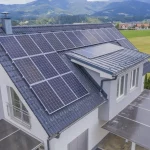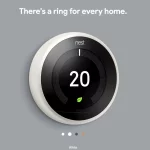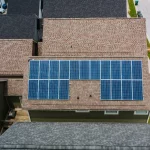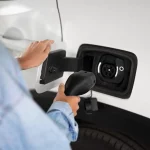Society in general is moving more toward renewable energy, and that’s certainly a good thing. Many households are also looking to reduce their energy bills and how much they rely on the national grid. When it comes to energy independence, solar panels and solar batteries are the way forward. In fact, understanding battery storage for home use can tick all of those boxes and then some!
In this comprehensive guide, we’ll cover everything you need to know about battery storage systems. We’ll go through the different types, specifications, installation, maintenance, and how much they cost. In the end, you’ll have all the information you need to make an informed decision moving forward.
TL;DR
- Battery storage systems allow you to store electricity to use later. This ensures cost savings, reliability, and energy independence.
- There are three main types of batteries. These are lithium-ion, lead-acid, and flow. Each type has its advantages and disadvantages.
- Proper installation and regular maintenance are vital to ensure longevity and safety.
- There are financial aspects to consider. These include the upfront costs, savings over the long-term, and potential incentives.
- When battery storage is integrated with solar panels, it can maximise energy savings and reduce reliance on the grid.
- Future trends include new technologies such as solid-state batteries and smart home integration.
Overview of Battery Storage for Home
First things first, we need to define what battery storage systems actually are. Basically, they’re designed to store electricity so you can use it later on. This is particularly useful if you experience a power outage for whatever reason, or for use during evening hours. Additionally, you can sell the surplus electricity stored in your solar battery back to the grid. Yes, opting for battery storage for home use can actually make you money!
By choosing a solar battery, you can become far more independent from the energy grid. This can lead to independence increases of anywhere between 60-80%*.
*Disclaimer – These figures depend on the individual’s usage, generation and battery size.
Importance of Battery Storage
Solar panels allow you to use more sustainable and ‘green’ electricity, but a home battery can increase the benefits. Firstly, your energy bills will reduce even further. This is because you can store energy during off-peak hours and then use it during peak-hours. Secondly, you can rely upon the energy you’ve created during power outages*. As a result, everything continues running without any issues.
*Emergency Power can only be used if the battery has an EPS and can operate on island mode.
Types of Battery Storage
There are three main types of storage batteries: lithium-ion, lead-acid, and flow. Here at Soly Energy, we use Enphase, GivEnergy, and Fox batteries, and they all have a 15 year guarantee. These are extremely high quality and fall into the lithium-ion category. To help you understand the differences and how this type of battery compares, let’s delve further into the three types.
Lithium-Ion Batteries
The lithium-ion solar battery is very popular because it has a high energy density. It also has a longer lifespan and is very efficient.
Of course, these premium benefits do come at a cost – a literal one. Lithium-ion batteries are more expensive, however they’re cost-effective over the long-term because of their life-span.
Lead-Acid Batteries
Lead-acid batteries are lower in cost, which makes them an affordable choice. However, they have a shorter lifespan and lower energy density. If you’re looking to cut costs when choosing a storage battery, a lead-acid type could be suitable for you.
Flow Batteries
Flow batteries are the final type. These are quite bulky and expensive, which makes them suitable for larger buildings, such as offices or shops. They’re not the ideal choice for a regular household. However, they have a long lifespan and good stability.
Technical Specifications
It’s important to get a little technical and understand the key specifications of your home battery storage system. This will help you make the best decision possible. So, what should you look at? The most important aspects are power output, capacity, lifespan, and efficiency.
Capacity and Power
The battery capacity tells you how much energy the battery can store. This is measured in kWh. However, the amount of power is measured in kW, and that measures the rate the battery discharges energy. When using a battery at home, it’s important to choose the right capacity and power output.
Choosing the Right Capacity
A 5kWh battery is sufficient for a regular two-bedroomed home. However, we also supply 10kWh and 15 kWh for larger homes. When opting for solar battery storage, a useful route is to conduct an energy audit. This will tell you the capacity your home needs, and allows you to choose the right battery.
Power Output
A solar battery with a higher power output is ideal. This means your battery can supply more energy at any one time, e.g. more than one appliance. Again, knowing how much energy you use can help you make the right choice.
Efficiency and Lifespan
The lifespan is how long your battery will last before you need to replace it. Efficiency is how much stored energy can be used. The best choice here is a long lifespan and high efficiency, giving you the best of both worlds. Our home energy storage systems have a guaranteed 6000 charging cycles. To put that into perspective, an average home uses around 345 cycles every year.
So, a sustainable solar battery should last you around 15 years, depending on usage.
Round-Trip Efficiency
When choosing solar battery storage, round-trip efficiency is something you need to know about. This is the amount of energy lost during charging and discharging cycles. If you opt for a battery with higher efficiency, you’ll lose less energy. As a result, you have a more environmentally friendly and cost-effective system.
Cycle Life
Finally, we have the cycle life of a solar panel battery storage system. This is the number of charge and discharge cycles a battery can undergo before it starts to degrade. If a battery has a higher cycle life, it’s more cost-effective over time and a lot more durable.
Comparison of Battery Types
| Battery Type |
Energy Density |
Lifespan (Years) |
Cost |
Ideal For |
| Lithium-Ion |
High |
10-15 |
High |
Long-term storage, frequent use |
| Lead-Acid |
Low |
5-7 |
Low |
Short-term storage, backup |
| Flow |
Medium |
10-20 |
High |
Large-scale storage, stability |
Battery Capacity Needs by Home Size
| Home Size |
Typical Capacity (kWh) |
Peak Power Output (kW) |
| 1-2 Bedroom Home |
2-5 |
3-5 |
| 3 Bedroom Home |
8 |
6-8 |
| 4-5 Bedroom Home |
9-13 |
10-12 |
Installation and Maintenance
It’s important to ensure that your home energy storage system is installed correctly and maintained regularly. This goes for solar panel installation too.
Installation Steps
The first step on your journey to home storage battery installation begins with our online configurator. This tool will help you determine your expected savings. Once you’ve got an idea , you can then book a free consultation with one of our experts. They will answer all your questions and guide you through the entire process from start to finish.
After your consultation, you’ll receive a quote that outlines all costs. If you’re happy, you’ll sign the agreement, and we’ll quickly arrange technical approval. Then, we’ll schedule a day to come and install your battery storage for solar panels. Your solar battery installation should take no longer than a day, and then you’ll be able to start using your solar battery to store your excess energy.
And don’t worry, all of our solar installers s are accredited and certified!
Maintenance Requirements
Your home battery system will need regular maintenance to keep it ticking along nicely. This includes software updates and system checks.
Monitoring Systems
The use of a monitoring system is important because it helps to detect issues early. This means that safety hazards can be identified and put right before any major problem. Such systems give real-time data on the performance and health of the solar panel battery.
Emergency Procedures
Additionally, it’s vital to have clear emergency procedures in place. This means knowing what to do if the battery malfunctions, overheats, or any other issues occur.
Maintenance Checklist for Home Battery Storage Systems
| Task |
Frequency |
Importance |
| Visual Inspection |
Monthly |
Ensure no physical damage or leaks |
| Software Update |
Quarterly |
Keep the system updated and secure |
| Performance Monitoring |
Ongoing |
Detect issues early and optimise usage |
| Professional Maintenance |
Annually |
Comprehensive check and servicing |
Financial Considerations
It goes without saying that the cost of home batteries is important. You need to know what to expect before you make a decision. So, let’s break down the upfront costs, potential savings, and possible financial incentives.
Upfront Costs
The biggest cost of home battery storage for solar panels is upfront. This covers the battery itself, installation, and if your home electrical system requires any modifications. However, it’s important to remember this is a one-off payment and from there, you will save money.
Battery Cost
At Soly Energy, we use lithium-ion batteries, and the cost depends upon the energy capacity you choose. Our 5kWh batteries cost £4,325, 10kWH cost £6,950, and our 15kWh cost £9,405. These all come with a 15 year warranty, and a guaranteed 6000 cycles. The number of solar panels you can use with these batteries depends. For instance, our 5kWh batteries can be used with up to 15 panels. However, our 10 and 15kWh solar storage batteries can be used with up to 30 solar panels.
Installation Cost
The installation cost of your home battery storage system varies depending upon your circumstances. However, we will ensure that you have a full quote before we go ahead with installation. You can calculate your potential savings using our online tool.
Long-Term Savings
It’s true that solar panel battery storage can certainly lead to big savings on your electricity bills. The actual amount you’ll save every year depends on several factors. However, by using your battery and storing off-peak energy to use in peak times, you’ll notice a big difference.
You can also use solar batteries to store excess energy and sell it back to the grid. Again, more savings heading your way!
Financial Incentives
As governments become more focused on green energy, more financial incentives like rebates and tax credits appear. These are ideal because they can reduce the initial cost of installing solar panels and a home battery.
Such incentives vary according to location but it’s certainly something to be aware of and research the potential benefits.
Integration with Solar Panels
Integrating solar storage batteries with solar panels can maximise your energy savings. By placing solar panels on your roof, you’re already halfway to cutting costs, but a battery takes it even further.
Let’s dig deeper into the potential benefits.
Enhanced Energy Independence
The first benefit means independence in a big way. Solar panel battery storage means that you’re not totally reliant upon the grid. You’ll have more control over how much energy you use and how much it costs you. You’ll be generating and then storing your own energy so you will always have electricity on hand. You’ll be self-sufficient, and if there’s a grid power outage, you’ll be golden.
Environmental Impact
Another huge benefit is the positive impact solar energy has on the environment. . Battery storage for home use can help you reduce your fossil fuel usage, and lower carbon emissions. Overall, you’re doing your bit for the planet and reducing your home’s carbon footprint.
Safety Considerations
Safety always comes first and there are several things you need to know when dealing with home energy storage systems. This includes safe installation, usage, and regular maintenance. In this section, let’s talk about the main aspects to be aware of.
Installation Safety
Both solar panels and battery storage for home use should be installed by a certified professional. Luckily, at Soly Energy, all of our installers are certified and accredited to give you total peace of mind. In fact, they’re accredited several times, by HIES, TrustMark, and MCS.
Electrical Safety
During installation, your electrical system will be checked to ensure it’s compatible with the solar battery storage system. During this check, the wiring circuit breakers, and general electrical infrastructure will be assessed.
Ventilation and Cooling
Your home battery also needs to be installed in an area that is well-ventilated and where cooling systems are available. The hope is that it will never happen, but if so, these measures will prevent overheating and potential fires. Safety first!
Future Trends and Innovations
Technology moves at a breakneck speed, and there’s no exception when it comes to home battery storage systems. Let’s delve into future innovations and see what to expect in the coming months and years.
Emerging Technologies
New battery technologies like solid-state batteries and advanced flow batteries look set to appear soon. These offer a longer lifespan and higher efficiency. When they arrive, these batteries will offer more cost-effectiveness and reliability.
Solid-state home batteries have a higher energy density than regular solar batteries, such as lithium-ion. They use a solid electrolyte rather than a liquid one which reduces the chances of leakage. This gives you a safer outlook.
Additionally, advanced flow batteries have increased storage, so they’re ideal for larger buildings. These batteries use liquid electrolytes that can be stored in external tanks, so they offer a flexible solution.
Integration with Smart Home Systems
Your solar panels and solar battery can be integrated with a smart homes system for even more control. Let’s explore this in more detail below:
Smart Energy Management
A smart energy management system optimises your energy usage by adjusting and charging/discharging your battery automatically. It does this based on your energy needs and the conditions of the grid. Over time, you’re looking at big savings and better efficiency thanks to solar storage.
Automation and Control
Another key feature of a smart home system integrated with a solar panel battery is that you can automate. You can schedule when you want your heating to come on, monitor remotely, and integrate with other devices.
Learnings Recap
We’ve covered a lot of ground, but hopefully you’re now much clearer on what a solar battery does. We’ve talked about the basics of battery storage systems and even talked about the latest innovations on the horizon. So, to ensure you’ve absorbed all this information, let’s recap the main points:
- A battery storage system allows you to store electricity generated by your solar panels for later use. Doing this allows you to save money on your energy bills and increases reliability. You can also become increasingly independent from the energy grid.
- There are three main types of batteries: The main types of batteries include lithium-ion, lead-acid, and flow batteries. Each type has advantages and disadvantages. Here at Soly energy, we use lithium-ion batteries by Enphase, GivEnergy, and Fox.
- It’s vital to have your solar battery installed properly and to perform regular maintenance. This will ensure longevity and safety.
- There are some financial considerations to take into account. The biggest cost is the initial, upfront amount. However, this can be offset with incentives such as government grants and tax credits. Over the long-term, you’ll notice savings on your energy bills.
- Solar panels with solar battery storage is the ultimate combination. Integrating these will maximise energy savings and reduce your reliance on the grid. You can even look to sell some of your excess energy to the grid itself.
- As technology continues to evolve , there are emerging innovations on the horizon. These include solid-state batteries, flow batteries, and smart home integrations.
Final Thoughts
There’s no denying that a home battery storage system could give you increased energy independence and save you money. It can also help you do your bit for the environment. However, many people don’t understand how solar batteries work. That’s no longer your situation!
Throughout this guide, we’ve talked about the different types of batteries, technical specifications, and installation. We’ve also talked about costs, and future trends. You now know everything there is to know about solar batteries and you can make an informed decision.
At Soly Energy, we’re keen to help you choose the right solar energy system for your needs. As a Which? Trusted Trader, we understand you may have questions and concerns. So, don’t hesitate to explore our range of products and services, designed to help you become more energy-efficient. We’re also on hand to answer any of your questions – just get in touch with one of our solar experts. We have more than 35,000 happy customers and we’re waiting for you to join that group today!



